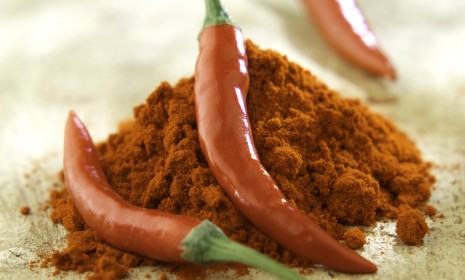Is a spicy meal good for your heart?
The hot kick of Indian cuisine might help the body ward off heart disease, says a new study from Penn State

A free daily email with the biggest news stories of the day – and the best features from TheWeek.com
You are now subscribed
Your newsletter sign-up was successful
Heat seekers take note: A spicy curry might be good for your heart. Researchers from Penn State found that increasing the amount of spices in your diet may lower the level of potentially harmful fat in your bloodstream. Here, a brief guide to the research:
What kind of spices are we talking about?
Sheila West, a researcher at Penn State, suspected that certain anti-oxidant spices might help lower a patient's risk of heart-related ailments. In this study, the team used a spice blend of turmeric, garlic, oregano, paprika, rosemary, and ginger to jazz up meals. "We've seen before that spices like cayenne pepper might increase metabolism and help with appetite suppression," says Melanie Pinola at Lifehacker, but this study suggests that a spicy kick may lead to a healthier heart, too.
The Week
Escape your echo chamber. Get the facts behind the news, plus analysis from multiple perspectives.

Sign up for The Week's Free Newsletters
From our morning news briefing to a weekly Good News Newsletter, get the best of The Week delivered directly to your inbox.
From our morning news briefing to a weekly Good News Newsletter, get the best of The Week delivered directly to your inbox.
How did spicy food help?
The experiment compared two groups of healthy, overweight men. One group ate meals seasoned with the special spice blend; the other ate the same meals prepared without the heat. Men who ate the spicy food saw a decrease of one-third in the level of triglycerides (a type of fat linked to heart disease) in their bloodstreams, and 20 percent lower insulin levels overall — even when the meals were high in fat and made with heavy oils. "It was surprising," West tells NPR. "I didn't expect such a large decrease."
Why is this?
"Anti-oxidants, like spices, may be important in reducing oxidative stress and thus reducing the risk of chronic disease," she says. Oxidative stress has been linked to an array of diseases, from heart disease to arthritis to diabetes.
A free daily email with the biggest news stories of the day – and the best features from TheWeek.com
So what kind of foods should I be eating?
The next step is to determine which spices, in particular, are most effective in lowering triglycerides. But traditional Indian cuisine — with heavy dustings of cumin and coriander — may help interim eaters reap the study's benefits. This is certainly "good news for those of us who love a rich curry made with lots of turmeric or bold amounts of garlic and oregano," says Allison Aubrey at NPR. "In the future, it's possible that spices will play an elevated role in medicine, with specific recommendations for preventing disease."
Sources: Everyday Health, Global Post, Lifehacker, NPR
-
 Political cartoons for February 14
Political cartoons for February 14Cartoons Saturday's political cartoons include a Valentine's grift, Hillary on the hook, and more
-
 Tourangelle-style pork with prunes recipe
Tourangelle-style pork with prunes recipeThe Week Recommends This traditional, rustic dish is a French classic
-
 The Epstein files: glimpses of a deeply disturbing world
The Epstein files: glimpses of a deeply disturbing worldIn the Spotlight Trove of released documents paint a picture of depravity and privilege in which men hold the cards, and women are powerless or peripheral